With its Humanitats Festival, the city of Dénia welcomes influential thinkers and experts in economics, neuroscience, medicine, anthropology, philosophy, history, geography, humanistic thought, ethics and culture, among many other scientific and artistic disciplines. For one weekend it thus becomes the capital of critical thinking thanks to its extensive program of conferences.
- 1.
- 1.1.
- 1.2.
- 1.3.
- 1.4.
- 1.5.
- 2.
- 2.1.
- 3.
- 3.1.
- 3.2.1.
- 3.2.2.
- 3.2.3.
- 3.2.4.
- 3.2.5.
- 3.2.6.
- 3.2.7.
- 3.2.8.
- 3.2.9.
- 3.2.10.
- 3.2.11.
- 3.2.12.
- 3.2.
- 3.3.1.
- 3.3.2.
- 3.3.3.
- 3.3.4.
- 3.3.5.
- 3.3.6.
- 3.3.7.
- 3.3.8.
- 3.3.9.
- 3.3.10.
- 3.3.11.
- 4.
- 4.1.
- 4.2.
- 5.
- 5.1.
- 5.2.
- 6.
What is it?
A social and cultural event in Dénia where the wise men of the XNUMXst century reflect on the concerns of human beings in today's world and on the changes that will occur in the near future, in different debate sessions that will encourage dialogue between science, technology and the humanities.
The relevance and quality of the speakers participating in this multidisciplinary meeting make this festival a European benchmark in the field of humanities.
An annual meeting of reflection
About us? What we want? Where are we going? With these concerns as the driving force and after the experience of the pandemic that has renewed awareness of our fragility and the state of uncertainty that characterizes us, we propose an annual meeting for reflection aimed at citizens, individuals and corporations, who propose and demand a look criticism that allows us to understand the keys to the world in which we live. And act -individually and collectively- accordingly.
To spread the ideas and debates of the moment, in the midst of the confusion generated by the digital commotion, and to help citizens make them their own, Dénia intends to be the scene of an annual Festival of the Humanities. Through the convocation of representative figures of thought, science, economy and the arts, the Festival seeks to share ideas and experiences, in spaces and formats aimed at a wide audience, who feel challenged by the desire to think, create, imagine and live together. .
The idea will be developed from the different genres of humanistic culture: conferences and debates, but also exhibitions and other forms of artistic creation. It will feature leading figures of humanistic, economic and scientific thought, but also actors and creators from various disciplines, ensuring that ideas are deployed through different formats.
2023 Edition | Look back to know where we are going
The second edition of Dénia Festival de les Humanitats will revolve around a common idea Look back to know where we are going which will thematically channel the different debate sessions.
Because nothing is written in advance. The passage of humans on earth is built every day and the future is never alien to the past, although along the way there are changes and fractures that mark significantly differentiated stages. In the same way, the present is projected in the fabulations that we create about the future. We are a historical animal that has completed many stages on earth. And it has been equipped with technological prostheses that have made progress in adaptation possible, but also threats of increasing power, both due to the effects on nature in general and on humans in particular.
We have a rather short memory of this long history. To know most of our presence on Earth we must go to the genetic traces that humans have left. Writing has been an element as late as it is powerful to obtain testimony of the past. And science has helped us identify signals that went unnoticed. In fact, following humanity's path to know about past experience and to learn from it is a recent reality that has been gradually accelerating, and at this turn of the century we have new technologies that allow us to accumulate infinite information at the risk of dehumanizing the knowledge we have of ourselves. But our adventure has been developing with the anonymous and daily transmission of each of the elements of the species. And so we have been coming together, despite being far away from establishing ourselves as humanity, although the world is smaller than ever.
History, philosophy, human sciences, literature, art, what we generically call humanities, have allowed us to trace the representation of the past on Earth. With the human condition as a reference and the ways in which we have been contextualizing and institutionalizing our experience, leaving traces of our passage. And science gives us news every day of the physical bases of this adventure. All of this causes us to accumulate a background to move forward that we do not always know how to use, and to construct proposals for the future, an expression of power relations often loaded with fantastic sublimations, which occupy utopian literature. The moods of the species mark moments of exciting horizons and times in which the future is full of uncertainties. And we do all this in competition with each other - power (that is, the difference in potential between a species that has no two equals) marks relationships with people - and looking for ways to crystallize the experience. Look back to know where we are going. To build the routes along which to travel beyond the future. Being aware that the human condition has genuine traits that adapt and mutate slowly. And that science, philosophy and creation - literary or artistic - are the ways we have to configure it and give it symbolic expression.
On this path where the past and the future, the humanities and science intersect, is the second Dénia Festival de les Humanitats. This meeting will allow us to glimpse the future with a sidelong glance at the past and attentive to the mutations that a species in accelerated transition from modernity may suffer.
2022 Edition | Mutations: what awaits us in the near future?
In one way or another, societies have always wondered about their condition, about their future, about how to make the human experience progress. Not in vain, as Yuval Noah Harari says, the human being is "the only one capable of creating fictions and believing them" and, to put it in the manner of Montesquieu, what differentiates him from the rest of the living is "reason and freedom". " (or, at least the idea that has been made of them).
Four centuries ago, when the development of modern science began, which would acquire an exponential force unthinkable at that time, the idea of progress was born that gave rise to the Enlightenment project, perhaps the noblest ideal that humanity has thought of (Kant) and that It then produced enormous economic and technological transformations, with obvious consequences in human life, in the state of the planet itself, and in the organization of societies. As a result of this great mutation, in little more than a century, from the mid-XNUMXth to the end of the XNUMXth, life expectancy in many countries has doubled.
We are now in a critical moment, after the short 1914th century (1989-XNUMX) has come to an end, in the words of Eric Hobswann, and astride the digital technology that has made the so-called globalization possible and the passage of the industrial economy to the financial and post-financial. In this context, questions about man overflow schemes, communication systems mutate rapidly, world government evolves towards new rules that are far from being codified, the passage from industrial to financial and post-financial capitalism changes economic coordinates, commonplaces about freedom and equality overwhelmed by the shadows of a new time, dystopian visions dominate the gaze on the future, vulgarized through the digital universe, powers are concentrated... And what about humans? Is it possible to think of the world giving centrality to our condition or must we consider the times in which the human being was intended to be the measure of all things to be over? Does scientific and technological progress cover the idea of progress of humanity? Is scientific and technological progress human progress?
Organizers
Dénia. Festival de les Humanitats is an initiative of the Generalitat, the Dénia City Council, the Foundation Baleària and the Dénia Ciutat Creativa Foundation, directed by Joseph Ramoneda and Jordi Alberich and coordinated by La Maleta de Portbou.
Festival Objectives
- Become a space for thought, reflection and dialogue on the human condition.
- Allow civil society to participate in an open forum for training and discussion with leading experts in the field of humanistic thought.
- Consolidate itself as an annual event with representative figures of thought, science, economy, theater, the audiovisual universe and the plastic arts to share ideas and experiences.
- Promote training in values and knowledge of the roots and history of the human being.
- Value and promote the humanities as a field of knowledge, especially among the youngest, to train a citizenry with critical thinking.
- Turn Dénia into a benchmark for thought, reflection and the humanities in the Mediterranean.
When is celebrated?
The first two editions take place in autumn, at the end of October, for three days. In 2023, will take place between Thursday, October 26 and Saturday, October 28. However, throughout the year parallel activities of the festival are carried out in Dénia.
Hours of each day
You can check the complete schedule here: Program of the Dénia Humanitats Festival.
Conferences
Second Edition - 2023
Literature against democracy-racism
The phenomenon of immigration has reached a level that determines world politics. This is why racist parties are emerging, one after another, especially in Europe, even coming to power in some countries. I call this situation DEMOC-RACISM. The racism that grows with the vote of the people.
This is a period that Huntington called the "War of Civilizations." But it is objectionable to see civilization only in the context of religion. The name “Clashes of ignorance”, formulated by Edward Said, is more precise, but we still need to be even more precise. Let's call this problem "Prejudice Clashes." Because our history is full of them.
The most prominent solution to this problem is literature. We need literature to understand people, not with clichés such as religion, flag, nationality or sect, but with the identity of human beings who love, suffer, hunger and fear. Goethe was a pioneer and started a movement he called "Weltliteratur" (universal literature). We must follow this path.
Past and future of ideologies
The future of rights and the rights of the future is one of the great questions that we must ask ourselves in the face of the enormous change that technology is operating in our lives: what remains, for example, of individual rights in the face of the globalization of economic powers , artificial intelligence or advances in intervention in the human body? The ideologies that have articulated the contemporary world decline. How should we imagine the ideological framework of the future, with a few universal powers, increasingly powerful, above the States? Does liberal democracy have a future in this new world or is the move towards post-democratic authoritarianism inexorable?
Health and technology in a global world
Of all the sectors that will be transformed thanks to the technological revolution, global health is one of the ones that raises the most hope. From the use of messenger RNA in the development of a new generation of vaccines, to the applications of artificial intelligence in understanding climate health challenges, the future is full of opportunities.
But technology by itself will not solve some of the challenges that hinder the right to health of a considerable part of the world's population, such as inequality, misinformation or perverse incentives in pharmaceutical innovation. In fact, it could aggravate them.
The session “Health and technology in a global world” will address these issues with the help of experts who offer an international and interdisciplinary perspective.
Post-democratic authoritarianism
Although the political sphere must always be understood dynamically and in accordance with the continuous changes that occur in it, in recent times we have witnessed certain transformations that erode some of the bases on which our democracies are based. The rise of what is called the new radical right, the illiberal drift of countries that are part of the European Union or the belligerence of the so-called cultural battles with which previously acquired rights are curtailed, are some of the examples that appeal to the challenge of reflect on the vicissitudes of our present and future. Led by two renowned journalists who have extensive experience in political analysis, we will discuss how to think about current political challenges, as well as the role that the media have in providing information as key actors in any society. democratic.
War and wars
The First World War, with its overwhelming number of victims, the continued suffering of soldiers on the battlefields and the modernization of combat, began “the descent into hell,” which consolidated the Second World War. Between 1939 and 1945, 60% of the 40 million victims were innocent civilians, subjected to planned extermination - Holocaust -, mass killings, forced labor, deaths from starvation or systematic bombings that culminated in the atomic bombings of Hiroshima and Nagasaki. In the second half of the XNUMXth century, colonial conflicts in the context of the Cold War, such as the Indochina and Vietnam wars, transformed the experience of war into an unequal combat, although civilians were also the greatest victims, as they have continued to be. in the remaining wars of the XNUMXth and XNUMXst centuries. Led by two prominent specialists, Joanna Bourke and Xosé Manoel Núñez the battlefield or to civilians, or how the same war events configure different national historical memories and various public uses of the past.
Utopia, Dystopia and power
When we read the science fiction novel The Ministry of the Future, by Kim Stanley Robinson, about climate change and global warming, two issues draw attention: the temporal proximity of that future, since the work was published in 2020 and the Ministry The one he refers to is imagined to have been founded in 2025, and that it is a novel about political action. In January 2021, in the midst of an unexpectedly dystopian present, the European School of Humanities organized a meeting entitled “Fear and hope: utopias and dystopias in the arts and mass culture”, whose contributions were published as a thematic dossier at number 46 of La Maleta de Portbou. To this binomial, utopia and dystopia, a third term is now added, power, which means that the discussion is not reduced to the realm of fiction, of the imagination of possible futures, but jumps to politics. To make this leap, the starting point of the debate will be another text published in La Maleta de Portbou, the article by Marina Garcés “The strength of a promise” (no. 59, July-August 2023)
A possible ecological future
The climate emergency is already here, knocking loudly on our door. The terms with which we designated extreme phenomena have become obsolete. The fires are now in their sixth generation. The warm nights are no longer tropical, but torrid and even hellish. There is already talk of climate boiling and droughts have become megadroughts. Eleven thousand premature deaths in Spain alone in 2022 due to the heat... We have entered a new reality. What ecological future are we heading towards? No other of the great crises that sweep the world will define the XNUMXst century as the answer to that disturbing question. Is the ecological collapse of the Earth system inevitable as a result of unleashed anthropogenic forces? Is there still reasonable room for hope to avoid the worst scenarios and consequences? What can we learn from the last fifty years that will help us improve that possible future? How can we build an active political, social, cultural resistance that makes a certain difference? How do we personally position ourselves in the face of this emergency?
What can literature teach us about the future?
Literature has deepened human, social and planetary knowledge throughout time. Many of the contributions are surprising for their validity and for the way they project signals about our increasingly present future. In this sense, to focus the debate, we could stick to the topic of human freedom. What does literature tell us about freedom? (or in plural, about freedoms). What are your threats? Are they irreversible conquests? Precarious? Should they be obtained in each generation? Where is the greatest difficulty in maintaining them? In the fight against barbarism? "The will to power"? Bureaucracy? Is despotism an intrinsic quality of the individual?
Lluís Vives Space The socioeconomic roots of a growing unrest | The role of the company
In the early moments of the 2007 financial debacle, many of us wanted to believe that it would serve to address the deeper reason for the disaster. It was not like that, in the same way that it has not been like that due to the pandemic or so many other warning signs that we continue to ignore. We strive to apply technical solutions to economic problems that, while necessary, are insufficient; and in pointing out populist political movements as if they were the origin of the problem, when they are nothing more than one of its manifestations.
To redirect the deep-rooted social unrest, which is directly reflected in the debacle of traditional politics, we must approach its deepest reasons: the collapse of a model of society that welcomed the person and projected them into the future. We have neglected the lessons of history and have not considered what is unalterable about the human condition: its need for roots and recognition.
To approach these issues, we have two speakers recognized for their ability to go beyond the obvious. Sophie Baby is a historian and has focused most of her intellectual career on understanding the forces that lead to social conflict and its outbreak. Antón Costas is recognized for incorporating the lessons of history and the approach to the psychology of the person into strictly economic analysis.
Possible futures: humans beyond the Anthropocene
With the new century, humanity begins a new stage that mixes enormously promising scientific avenues with growing uncertainties about our ability to survive as a society. Bioengineering and artificial intelligence can change our relationship with disease (including aging) and even help preserve biodiversity and fight climate change and the other negative effects of the Anthropocene. Can we develop a society that enjoys new opportunities for individual and global health? Is it possible to preserve biodiversity in a world where more and more resources are needed to sustain a still growing humanity? The challenge of achieving this goal requires not only the resources to make it real. It is necessary to inform society, bring critical knowledge to the world of education, develop policies where science plays a fundamental role and fight against misinformation.
Can we constitute ourselves as humanity?
Humanity is affected by increasingly interconnected global challenges (climate crisis, pandemics, displacement of people, wars) that are usually addressed with solidarity initiatives, science and fundamental values such as dignity, equality, justice and care for the planet. To find a way to overcome these antinomies and constitute ourselves as humanity, we must understand what makes us essentially human. Tomás Marqués, from evolutionary biology, will enlighten us on his discoveries in primates. For his part, Víctor Gómez Pin, philosopher, will give us a look at this XNUMXst century and its technological and knowledge potential. Let us keep in mind that societal changes occur over very long periods - such as the passage from the Middle Ages to the modern world - and that what is new is little visible to those of us who are immersed in this transition that, perhaps, will lead us to a new humanity.
Humanities, science, and artificial intelligence
At the closing point, it is foreseeable - and desirable - that a stream of ideas, opinions, doubts, questions and also hopes and lights have flowed in this Second Edition of the Dénia Festival de les Humanitats. It is very likely that we have shared the need for a plea in defense of ethical reflection to supervise the great disruption that the so-called Fourth Industrial Revolution or Second Age of the Machine means. We live, bewildered, at a crossroads in which different narratives compete for perspective and also for the attitude with which we imagine an increasingly imminent future. Either we take advantage of the opportunity to build a better world for humanity and the planet (inseparable realities) or, as many experts point out, we are heading towards the apocalypse. Artificial Intelligence constitutes the greatest challenge that technology - a consequence and result of our own creativity and ingenuity - has in store for us as a species. Perhaps it is nothing that we have not known since the beginning of time: with the same stones we can build bridges or impassable walls. The evolution and outcome of the great transformations underway will depend on our intentions and purposes. Only a technocritical position that privileges the dignity of human life should have a future. Whatever the case, we need to know, share and face together this challenging moment that we have to live, suffer or celebrate. Rescuing the humanistic gaze and the critical attitude that philosophy means (Europe as an attitude, as Husserl would say) emerge as an urgency in this complex and fascinating time.
First Edition - 2022
Bionic Man: Can We Delegate Our Luck to Our Prosthetics?
Today's society is immersed in one of the most complex and disruptive revolutions in its history. This, unlike all the previous ones, is generating a much more global, subtle and profound transformation. This 4.0 revolution is making possible an unprecedented development of biotechnology and, with it, encouraging transhumanist and posthumanist movements of a cybernetic nature whose main objective is to transcend the human being through the creation of a new ⎯biotechnological⎯ species. This is the old idea of “bionic man”, an augmented human that combines person and machine to increase human biological skills and abilities. However, the path of the augmented human requires great biotechnological challenges, but also ethical and political ones. This will be, precisely, the leitmotif of this session.
Changes in the human body: disease and evolution
By definition, living things are changeable. The mechanism behind a constant change impacts, in a dual way, modifications that alter the function in non-predetermined ways. This constant pressure for change is innately associated with the concept of illness. This session will feature two expert speakers in development and neurology, with whom they will share thoughts on where we come from and where human beings are going, including the evolutionary significance of diseases.
Global world, closed borders
The 20s of this millennium will be known as a period of turbulence and global threats (financial crisis, adjustment policies, COVID-19 pandemic, inflation crisis, war in Ukraine, climate crisis...). These phenomena have abruptly underlined the interdependence of the world in which we live and the globality of the challenges we face without having global governance mechanisms with which to respond to them. Action in the face of these challenges has caused a permanent dilemma between promoting more cooperation and understanding that our problems are linked to the problems of others, or following the short-term and useless impulse of shielding our populations to protect them. This debate session will reflect on all these issues associated with the efficient management of human mobility.
History: what lessons from the past can help us?
The famous historian Tony Judt, in his work On the Forgotten Twentieth Century, warned us against carelessness about remembering the past. He warned us of the risk of taking the XNUMXth century lightly and leaving it behind with too much confidence and too little reflection: “a world that has just been lost and is already half forgotten”. He warned us that the greatest danger of ignoring what happened lay in the interpretation of the present as an unprecedented time, in which the past has nothing to teach us. In Judt's words, what "the past can help us understand is the perennial complexity of issues." Thus, as Yuval Noah Harari points out in his work Homo Deus, knowledge of the past allows us to understand how the course of events has shaped our technology, our politics, our society, even our thoughts, fears and dreams.
Society: how to get out of the patriarchal model?
The patriarchal model has colored our world and our society at such a deep level that a bias based on inequality between men and women has even been normalized and naturalized. It is urgent to deconstruct a system that condemns more than half of the population to live in fear and suffer different forms of sexist violence for the mere fact of being women. This debate session will try to analyze the way to end the patriarchal model through feminisms.
Fictions: how will we explain the world to ourselves?
One of the first things that this new century has shown is that science, ideologies and beliefs are not enough to understand the world. Events such as the attack on the Twin Towers in New York, the financial crisis of 2008/9, the covid-19 pandemic and the war in Ukraine have shown that human beings need answers to situate themselves in an environment that changes too quickly. How do you position yourself in a world where these events affect everyone? Four speakers, scientists, philosophers and theologians try to propose interpretations not only to place us in this world, but also to respond to its events in a productive way, that is, beyond the fictions to which we are accustomed.
Life: will the relationship of humans with the other species change? How will we feed ourselves?
What unites us and what separates us from the so-called animals in the human-animal relationship? The trump card of language and reasoning, a sense of humor and the ability to honor the dead have been used to affirm the exceptional nature of the human being, creating a binarism between nature and culture that places us on a higher plane and subjugates the rest. of species. This debate will try to think of a new relationship with a natural world to which we also belong.
Lluís Vives Space: Humanities and Business
Never in the history of humanity have companies had so much power, nor has humanity had such a powerful instrument to convert scientific and technological development into technological and social progress. And, at the same time, humanity has never had so much power to self-destruct. And it is that technological and social progress is not, in itself, human progress. This debate will rethink the current meaning of the company and its function. It may be time for the enlightened company and we must face this mutation. About us? What we want? Where we go? Three questions that will fill, like the rest of the Dénia Festival of the Humanities, the Lluís Vives Space dedicated to business and the humanities.
Ecology: can we regain confidence in the future, avoid the dystopian world?
The climate crisis makes it harder than ever to believe in the future. The succession of alarming data on the state of the planet worries us, but it also paralyzes us. It seems impossible to do anything to avoid a dystopian future that is presented as inevitable. However, the ecological crisis also makes it more necessary than ever to think about the future. Now, when it is still possible to stop and reverse many of the worst effects of the crisis, it is essential to think about a fair future for all and, above all, how to get there.
inhabit the world
After centuries of urbanization and globalization, urban culture has come to embrace the entire planet. Surely, the 'uninhabitable' world that the current triple crisis – economic; climatic; Sanitary – draws us, it is to a great extent because we also find cities uninhabitable. It is by virtue of what happens and, above all, what does not happen in them, that the world will seem more or less possible to us as an environment, as a place, as a house, as a room. Inhabiting cities well at all their scales is surely the best shortcut not so much to being able to inhabit the world, but to be able to inhabit it in a different way.
Power: when the notion of limits is lost
Between the limits of power and the defects of democracy, politics navigates around the world, looking for its economic, technological and cultural accents. The spectacle is varied and often painful. Ideas are usually scarce in absolute figures and almost nil when it comes to the organization and administration of nations and peoples in the scenario that interests citizens. Philosophy, anthropology and self-styled political science study the phenomenon of power from different drawers of the great academic closet. But not trying to contrast and even mix its content can be a mistake, if it is a matter of improving the mistake, that "bad encounter" that La Boétie placed at the most original root of the city and civil power. This session will try to find examples and ask some questions about the limits of power.
Participants
Second Edition | 2023
- Zulfü Livaneli, composer and writer, author of Serenade for Nadia.
- Joseph Ramoneda, writer and journalist, content director of the Dénia Festival de les Humanitats.
- Chiara Bottici, philosopher and writer, director of Gender Studies and Associate Professor of Philosophy at The New School, author of Anarchfemminism (Bloomsbury, 2021).
- Christina Manzano, journalist, director of External Relations at the Ibero-American General Secretariat (SEGIB).
- Rafael Villasanjuan, journalist, graduate in Information Sciences from the Autonomous University of Barcelona (UAB).
- Christina O'Callaghan, co-director of the interuniversity master's degree in Planetary Health at the UOC-UPF-ISGlobal.
- Gonzalo fanjul, director of the Policy Analysis area of the Barcelona Institute for Global Health (ISGlobal).
- Pankaj Mishra, writer and essayist, author of Bland fanatics.
- Nuria Oliver, co-founder and vice president of ELLIS, chief scientific advisor at the Vodafone Institute and chief data scientist at DataPop Alliance.
- Carme Colomina, principal researcher at CIDOB, specialized in the European Union, disinformation and global politics.
- Manuel Alias, journalist, National Prize for Journalism and Media 2022.
- Soledad Gallego-Diaz, journalist, director of El País (2018/2020).
- Zira Box, professor in the Department of Sociology and Social Anthropology of the University of Valencia, co-author of Reactionary Nationalists, Fascists and Dictatorships in the Twentieth Century: Against Democracy.
- Joanna Bourke, Professor of History at Birkbeck College, London, author of Thirst for blood.
- Xosé M. Núñez Seixas, professor of Contemporary History at the University of Santiago de Compostela, author of Wolf's lairs. Memories of authoritarian Europe y Back to Stalingrad.
- Aurora Bosch, professor in the department of Modern and Contemporary History at the University of Valencia.
- Maria Noise, visual artist, researcher and cultural producer.
- Clara Serra, philosopher, researcher at the University of Barcelona, author of Lionesses and foxes.
- Antonio Monegal, professor of Theory of Literature and Comparative Literature at the Pompeu Fabra University.
- Christina Monge, political scientist, president of the Más Democracia association.
- Antxon Olabe, environmental economist and essayist, author of Need for an Earth Policy.
- Andreu Escriva, member of the Group of Experts for the Climate Emergency of Barcelona, author of Against sustainability.
- Edurne portela, writer, author of maddi and the borders.
- Martha Sanz, writer, author of Metal shutters snap down.
- Jordy Amat, philologist and writer, author of The chauffeur's son.
- Enric Balaguer, professor of literature at the University of Alicante and writer.
- Sophie Baby, historian, professor of Contemporary History at the University of Burgundy and junior member of the University Institute of France.
- Anton Costas, economist, professor of Economic Policy at the University of Barcelona and president of the Economic and Social Council.
- Jordi Alberich, economist, content director of the Dénia Festival de les Humanitats.
- Jordi Mercader, president of Miquel y Costas & Miquel, and president of the Gala-Salvador Dalí Foundation.
- Maite Anton, president of the Alicante Family Business Association.
- Patrici Calvo, professor of the Department of Philosophy and Sociology of the Universitat Jaume I, author of The Cordial Economy. Ethics, Recognition and Reciprocity.
- marti dominguez, essayist and writer, professor of Journalism at the University of Valencia, director of method and author of Mater.
- Núria Montserrat, ICREA researcher and leader of the Pluripotency for Organ Regeneration group at the Bioengineering Institute of Catalonia (IBEC).
- Ricard Solé, physicist, ICREA research professor, director of the Complex Systems Laboratory of the PRBB, UPF.
- Victor Gomez Pin, philosopher, professor emeritus at the UAB and researcher at the École Normale Supérieure in Paris.
- Tomàs Marquès i Bonet, evolutionary biologist, director of the Institute of Evolutionary Biology, Barcelona.
- Marcela Jabbaz, doctor in Sociology and professor at the University of Valencia, vice dean of Equality, Culture and Participation of the Faculty of Social Sciences of the UV.
- Arcadi Navarro, professor of Genetics and ICREA research professor at UPF, director of the Pasqual Maragall Foundation.
- Francesc Colomer, doctor in Philosophy and expert in Ethics and Artificial Intelligence, Secretary of Tourism of the Generalitat Valenciana (2015/2023).
First Edition | 2022
- Ximo Puig, president of the Generalitat Valenciana
- Joan Subirats, Minister of Universities of the Government of Spain
- Vicent Grimalt, mayor of Denia
- Theodor Kallifatides, writer, author of timandra y The past is not a dream
- Joseph Ramoneda, writer and journalist, content director of the Dénia Festival de les Humanitats
- Raphael Yuste, neurobiologist, professor at Columbia University, promoter of the BRAIN project
- Gustavo Deco, Research professor at the Catalan Institute for Research and Advanced Studies and professor at Pompeu Fabra University, director of the Computational Neuroscience research group and the Center for Brain and Cognition at UPF
- Martha Rodriguez, member of the Practical Ethics and Democracy research group at the UJI, professor of Ethics at the UPV and project manager at the ÉTNOR Foundation
- Mara Diessen, neurobiologist, researcher and university professor, world expert in the field of neurobiology and pharmacology
- Maria Angela Nieto Toledano, biochemist and molecular biologist, principal investigator at the Institute of Neurosciences (CSIC-UMH) of Alicante
- Thomas Marques, ICREA research professor at Pompeu Fabra University and head of the Comparative Genomics group at the Institute of Evolutionary Biology (CSIC/UPF)
- michel ager, anthropologist, professor at the École des Hautes Études en Sciences Sociales (EHESS) and researcher emeritus at the French Institute of Research for Development (IRD)
- Leire Pajin, Director of Global Development at ISGlobal, President of the Spanish Network for Sustainable Development (REDS) and former Minister of Health of the Government of Spain (2010-11)
- Muhammad Subat, journalist specializing in warfare and social and political affairs in Syria and the Middle East, editor of the online magazine Baynana
- Martin Baumeister, historian, director of the Deutsches Historisches Institut in Rom
- Xose Manoel Nunez Seixas, historian and writer, professor of Contemporary History at the University of Santiago de Compostela, author of Wolf's lairs. Memories of authoritarian Europe (2021) and Back to Stalingrad (2022)
- Heidi Cristina Senante, Jean Monnet Professor of History and Institutions of the European Union
- Zafra Remedies, writer and essayist, tenured scientist at the CSIC Institute of Philosophy, Anagrama Essay Award 2017 for The enthusiasm
- Najat El Hashmi, writer, Ramon Llull Award 2008 with The last patriarch
- Alba Alfajeme, psychologist specializing in sexist violence, professor at the University of Girona and author of When we call our names
- Carmelo Dotolo, full professor of Theology of Religions at the Pontifical Università Urbaniana, president of the Società Italiana per la Ricerca Teologica (SIRT)
- Ana Carrasco-Conde, professor of Philosophy at the Complutense University of Madrid, author of speak evil
- Xavier Sampedro, scientist and journalist, was a researcher at the Severo Ochoa Center for Molecular Biology in Madrid and at the Molecular Biology Laboratory of the Medical Research Council in Cambridge
- Santiago Zavala, ICREA Research Professor of Philosophy at Pompeu Fabra University
- Martha Segarra, director of research at the Laboratoire d'Études de Genre et de Sexualité-LEGS, of the Center National de la Recherche Scientifique, author of Humanimals
- Oscar Horta, professor of Moral Philosophy at the University of Santiago de Compostela, member of the Animal Ethics Foundation, author of A step forward in defense of animals
- Juan Jose Lopez-Burniol, vice president of the Caixa d'Estalvis i Pensions Banking Foundation of Barcelona ”la Caixa”
- Jordi Alberich, economist, content director of the Dénia Festival de les Humanitats
- Cesar Rendueles, philosopher, sociologist and essayist, professor of Sociology at the Complutense University of Madrid, author of Against Equal Opportunity: An Egalitarian Pamphlet
- Troy Vettese, environmental historian, Max Weber Fellow, author of Half-Earth Socialism
- Layla Martinez, political scientist, editor and writer, author of Utopia is not an island
- Adolfo Utor, President of Baleària
- Anton Costas, economist, professor of Economic Policy at the University of Barcelona and president of the Economic and Social Council
- Ricardo Mairal, rector of the UNED, professor of English Language and Linguistics in the Department of Foreign Philologies of the UNED
- John Romero, Professor of Human Geography at the University of Valencia and member of the Interuniversity Institute for Local Development (IIDL)
- ben wilson, historian, author of metropolis
- Francesc Munoz, geographer and urban planner, professor of Geography at the Autonomous University of Barcelona, author of Urbanization, common landscapes, global places
- Domingo Garcia-Marza, Professor of Ethics at Jaume I University, director of the Department of Philosophy and Sociology and director of the research group "Applied Ethics and Democracy"
- eva anduiza, Professor of Political Science at the Autonomous University of Barcelona, ICREA Academia researcher and director of the “Democracy, Elections and Citizenship” research group
- Agueda Quiroga, anthropologist and public policy expert, founder of Philosoc
- James Casals, philosopher, rector of the Universitat Pompeu Fabra (2013/2021) and professor of Philosophy in the UPF Department of Humanities
- Keshia Pollack-Porter, Chair of the Department of Health, Policy and Management at the Bloomberg School of Public Health, Johns Hopkins University
- Rafael Vilasanjuan, journalist, director of Analysis and Global Development at ISGlobal and member of the Civil Society Steering Committee of GAVI (The Vaccine Alliance)
- Sophie Roberts, writer, author of The last pianos of Siberia
Where are the stages?
The festival is divided into two stages, coinciding throughout the programming with simultaneous debates in each of the locations. In addition, some parallel events are held in other parts of Dénia, such as the Calle Marques de Campo and the Plaza del Consell.
Social Center
The Dénia Social Center Auditorium hosts half of the sessions, including the closing session. This is located in the heart of Dénia, at Carrer Calderón, 4.
La Androna Baleària Port Room
It is a room located on the top floor of the maritime station de Baleària, on the northern breakwater of the port of Dénia. Most of the conferences will be held here, as well as the opening session of the festival.
How much does it cost?
The price varies depending on whether you want a voucher to access several sessions or attend an event separately. You can buy the tickets here.
- Bonus 8 sessions: €20
- Individual session: €3

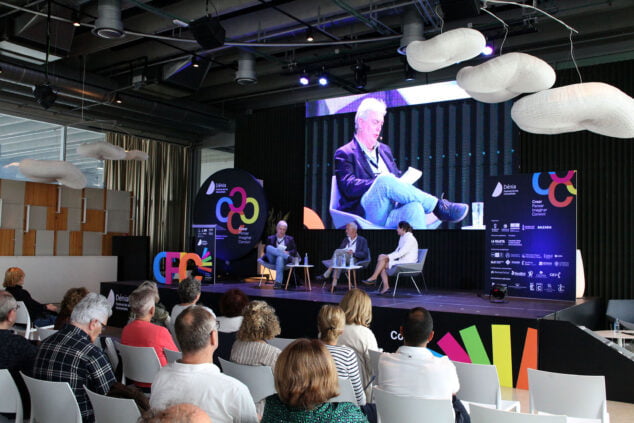
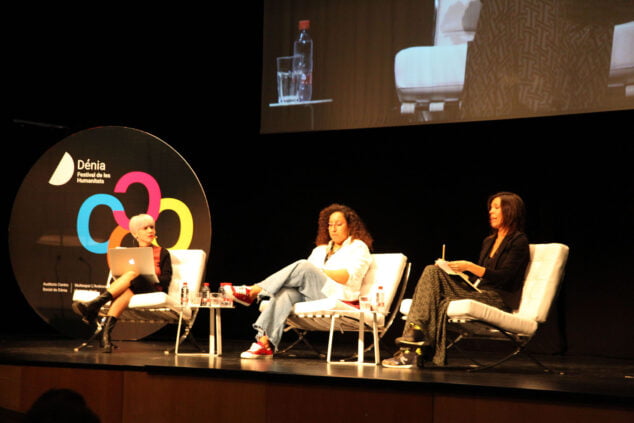
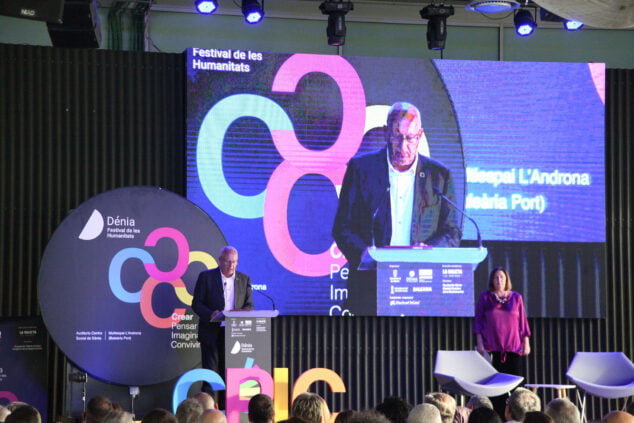
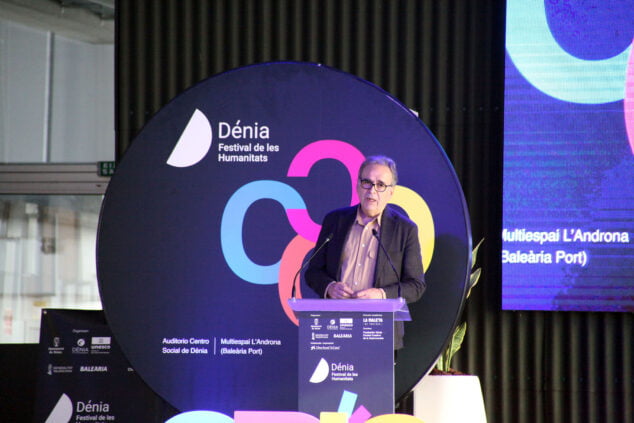
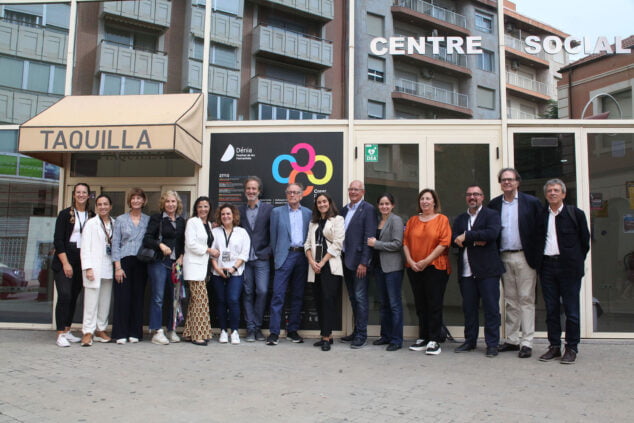
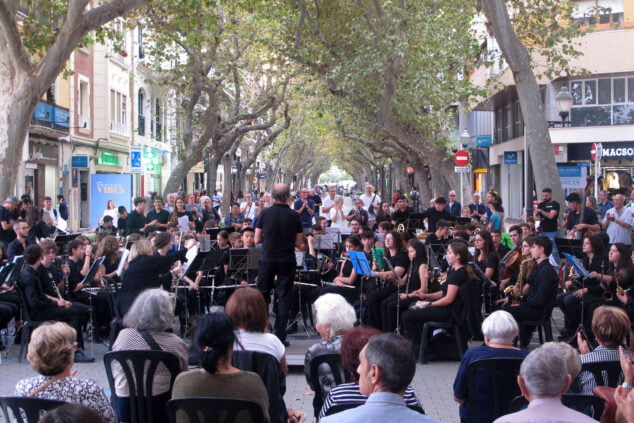

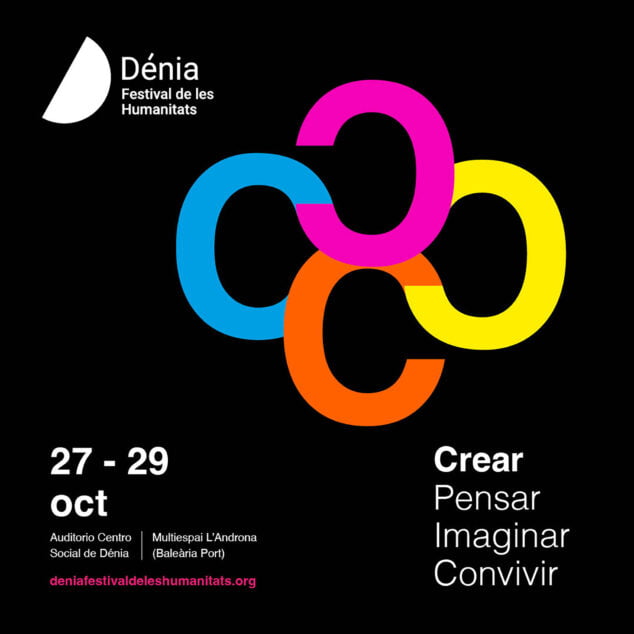

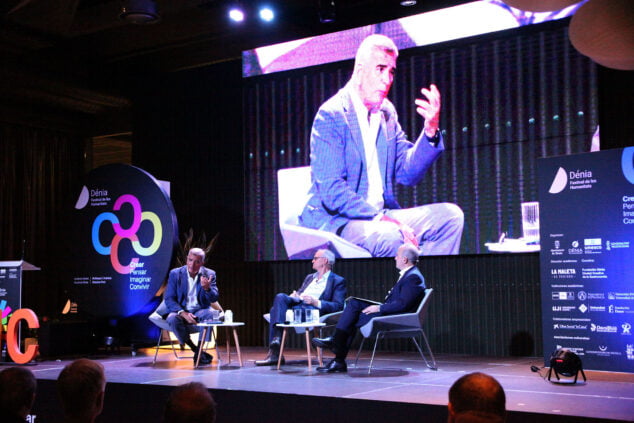
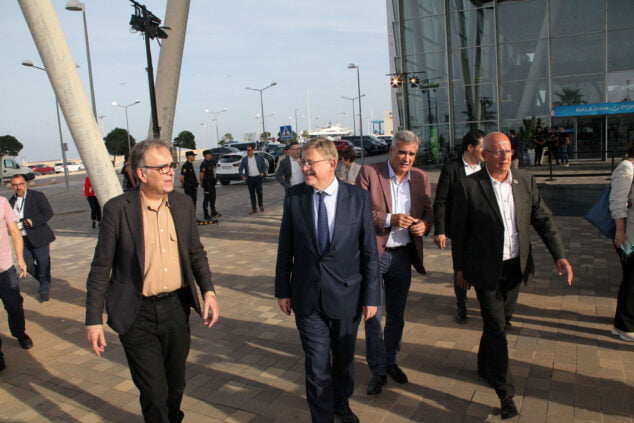
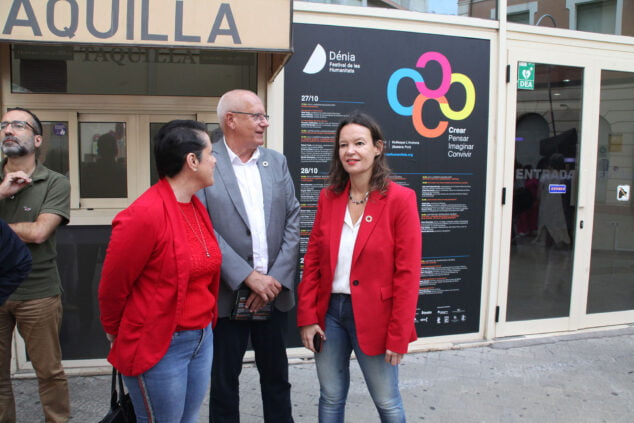
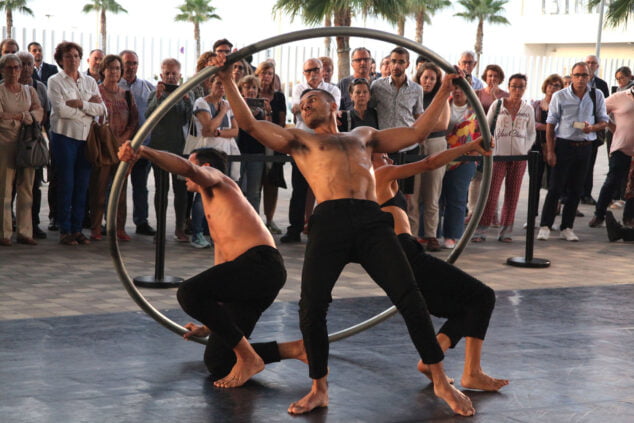
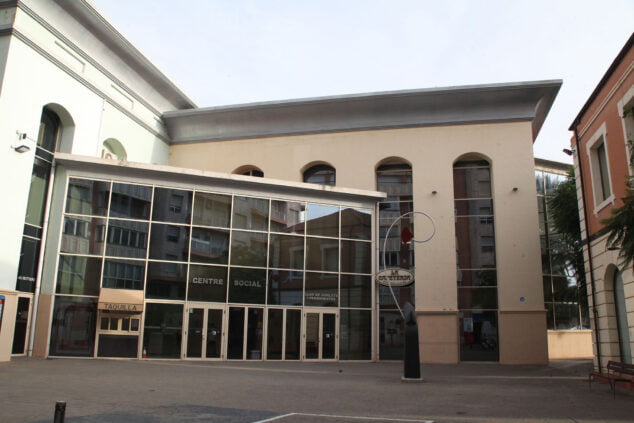
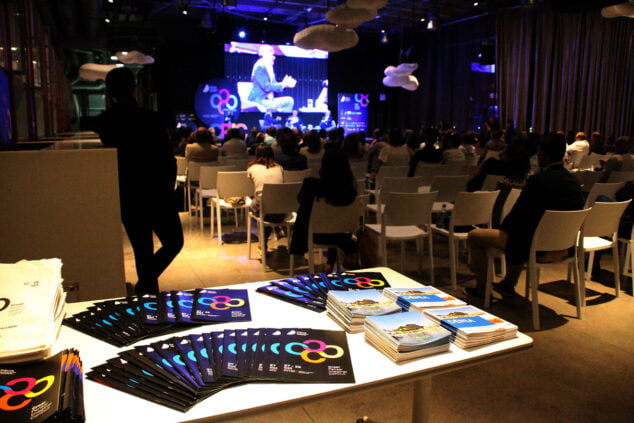

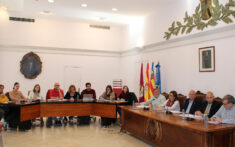




Capital of critical thinking?
Critical thinking?
Thinking of a sheep paid by taxpayers to sell us their motorcycle. On top of that you have to pay to attend, when the Marina Alta is the capital of poverty and destructive tourism, and speculation per square meter.
Now that is critical thinking.
– Leire Pajín, director of Global Development at ISGlobal, president of the Spanish Network for Sustainable Development (REDS) and former Minister of Health of the Government of Spain (2010-11)
The useless plugged-in ex-politics that discredits and points out the authentic empty nature of the supposedly cultural soirée,
– Juan José López-Burniol, vice president of the Caixa d'Estalvis i Pensions Banking Foundation of Barcelona ”la Caixa”
The one who manages the movements of public money to private pockets in a "subtle" way.
Mola,
200.000 are spent on DNA
, but to attend conferences you have to pay
It should be the other way around.
Free culture and entry to a pine-culinary event, with a small fee!